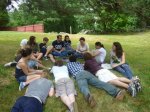by Rachael Sauceda
Tal Michaelis, 29, is a Jewish Israeli who works at Variety, a non-profit organization that supports and assists children with special needs in Israel. Born and raised in in Tivon, Tal did h er army service just outside of Jerusalem at an absorption center, and has lived in Jerusalem for the past four years.
er army service just outside of Jerusalem at an absorption center, and has lived in Jerusalem for the past four years.
Growing up, Tal had a generally liberal outlook and felt that Palestinians were being treated unjustly. However, her knowledge of “the other” was limited to what she gathered from the news or learned from her father. However, until participating in an ICCI program for young adults, Tal had never really met or talked with a Palestinian.
Out of curiosity and as a result of one of Tal’s friends past participation, Tal decided to participate in ICCI’s dialogue and action group. Tal merely wanted the opportunity to talk to Palestinians in order to know Palestinian perspectives of the conflict and what their realities are like. The program that she participated in through the ICCI dealt with collective memory in Israel, Palestine and Japan. Called “From Memory to Reconciliation,” this year-long program met every month for intensive workshops and seminars. Jewish, Palestinian and Japanese students came together to learn how the national or collective memory affects conflict, and as a result, how a nation can grow despite the downward pull of the conflict.
The group consisted of a delegation from Israel, consisting of Jews, Muslims and Christians as well as a group of Buddhist students from Japan. The Japanese students visited Israel for ten days and a few months later, a reciprocal visit to Japan was organized for the Jews and Palestinians. The program was sponsored by Risho Kosei-Kai, a Japanese Buddhist cultural and religious organization which worked with ICCI for four years.
Tal said she learned a great deal from her participation in this ICCI Dialogue and Action group. She reflected that it was often difficult to encounter “the other” especially since there was no one common language that all felt comfortable speaking and therefore necessitated a translator. However, Tal realized that through the translator the dialogue was effective. Even though it was difficult saying what you think and waiting for the translator to finish instead of automatically interrupting to dispute a point, you learn to be patient and develop active listening skills. Through the dialogue, members of the group were able to develop stronger listening and speaking skills and a greater ability to respect each other. As the seminar continued, many member of the group felt increasingly more comfortable to feel free to speak naturally.
Tal said that things changed for her after the year. Before the program, when she would hear Arabic, she would often feel insecure; but after participating in the group for a full year and hearing Arabic on a regular basis, she felt less afraid of the language, less paranoid. Tal felt that this feeling of fear was present in both societies. Indeed, much of what people do and think in this conflict is a result of fear. Participation in a dialogue and action group, according to Tal, can reduce the fear so that the ‘other’ is not so scary.
Tal continues to participate in Israeli –Palestinian dialogue groups. Currently, she is helping build a Jewish-Muslim study group that brings together Jews and Muslims from East and West Jerusalem. During their sessions, they focus on religious texts.
When I asked Tal about her sentiments towards Palestinians and the conflict before she participated in an ICCI program she said, “It’s hard to remember what I thought before because I have been so affected by the years after the program. “ Tal said that “From Memory to Reconciliation” made her more aware. Being able to talk to people her own age, including those from the other side of a conflict, gave her a different perspective on a world that she knew existed but had never met. She often learned much about what was going on in the West Bank, but was also often frustrated on hearing so many extreme points of view about the other, presented by both sides.
After participating in the ICCI dialogue group, Tal wants to continue meeting the other and delve deeper into the issues involved with understanding each other. Tal doesn’t think she can change the world, but by participating in more dialogue and action groups, she believes that more people will become less extreme and more receptive to the other.
Filed under: Alumni Community, ICCI Events, ICCI Programs, Interviews, JIYAF, Out and About in the Holy Land, Personal Stories and Testimonies, Stories of Inspiration |



Leave a comment